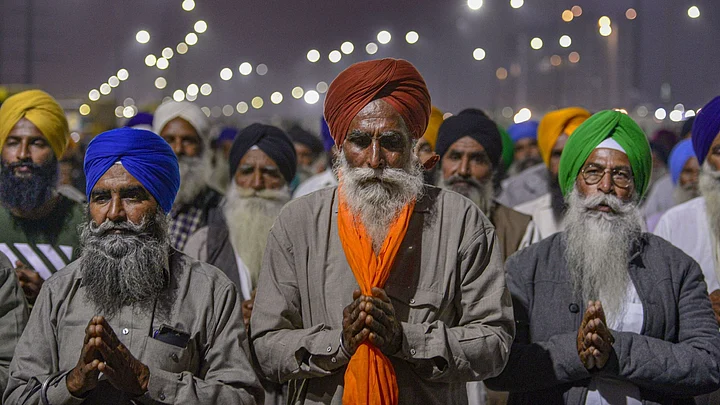Are the National Democratic Alliance government and the farmers' unions nearing an agreement on the three farm laws?
It may be too soon to say this, but there are some signs of a thaw that were evident in the meeting that took place between Union ministers and farmers' representatives.
This piece will look at what happened in the run-up to the meeting and the meeting itself and also examine whether an agreement is possible or not when the next meeting is held on 4 January.
A 'Cordial' Meeting
Even before the meeting between the farm unions and the Centre began on Wednesday 30 December, Union Minister Som Parkash said that the meeting will be "decisive" and that the government wants farmers "to celebrate the new year in their homes".
Parkash’s statement was a clear indication that the government may be willing to back down a little from its earlier position. Earlier, Union Defence minister Rajnath Singh in an interview to ANI, made conciliatory statements, which set the tone for a thaw from the side of the government.
The meeting itself was more cordial compared to earlier meetings. The Union Ministers – Agriculture Minister Narendra Singh Tomar, Commerce Minister Piyush Goyal and MoS for Commerce and Industry Som Parkash – partook in the langar that was brought for the farmers.
And for the first time, the farmers' representatives had the tea that was served at Vigyan Bhawan, unlike all the previous meetings in which tea was brought for them from the Delhi Sikh Gurdwara Management Committee.
The government has conceded that stubble burning clause will be removed from the Pollution Act and that farmers will be outside the ambit of the new Electricity Act.
Narendra Singh Tomar said after the meeting, “The first issue was an ordinance related to the environment. Unions were apprehensive about farmers being included. Both sides agreed to farmers' exclusion. Farmers feel that if reform is introduced in the Electricity Act, they will suffer losses. Unions want the electricity subsidy given to farmers by states for irrigation should continue. Consensus was reached on this issue also.”
The farmers' on their part, decided to postpone their tractor rally as a goodwill gesture.
But Are They Reaching an Agreement?
Not quite. The government is nowhere near conceding to the main demand of farmers - repeal of the three farm laws: Farmers Produce Trade and Commerce (Production and Facilitation) Act, 2020, Farmers (Empowerment and Protection) Agreement on Price Assurance and Farm Services Act, 2020 and Essential Commodities (Amendment) Act, 2020.
The legal status of MSP also remains unresolved, though Tomar said it will be discussed in the next meeting on 4 January.
According to Dr Darshan Pal of the Krantikari Kisan Union, “there is a deadlock on the three farm laws and we couldn’t reach a consensus on MSP”.
The Kisan Mazdoor Sangharsh Committee said on Thursday that the “government didn’t discuss the farm laws and seems to be avoiding discussion on them”.
Farmers now point out instances of companies duping farmers that have taken place since the passage of the new laws.
"Ever since new agrarian reform laws have been enacted, the incidence of cheating with farmers has increased. Merchants have opened offices in villages, bought crops from farmers and then run away. They have not paid the farmers their crop amount," said Baldev Singh Sirsa, a farmer leader from Punjab.
Maharashtra farmer leader Sandeep Gidde Patil told NDTV that a corporate gave a cheque of Rs 2 crore to 22 farmers in Harda district on Madhya Pradesh, which bounced. When the farmers went to the local police station, they were told that they have to go to the office if the Sub-Divisional Magistrate.
What Lies Ahead
The problem is that there is a fundamental divide between the farmers and the Centre which won't get addressed unless one side completely compromises on its beliefs.
The Centre is unlikely to back down on the three laws. On 19 December, Prime Minister Narendra Modi said that the new farm laws "weren't brought overnight" and that "farmers have already started benefitting from them".
The Modi government is completely convinced about the need for these laws. It doesn’t see increasing influence of a few corporates in the agriculture sector as a bad thing. Far from it, the government actively thinks that boosting Indian corporate giants and creating conditions for them to compete in the world stage is in the national interest.
On the other hand, the farmers see the three farm laws as a death knell for their livelihood.
Especially in Punjab, the farmers say that due to the Green Revolution, they compromised on the sustainability of their agriculture – especially water table and soil quality – so that the food security needs of the country could be satisfied. So the government now withdrawing support and making them vulnerable to corporate interests, is seen as a betrayal.
As a result, there can’t be a compromise unless the government decides to repeal the laws or at the very least stay them for a fixed period.
On Thursday, farmers brought down barricades at the Shahjahanpur border between Rajasthan and Haryana and entered the latter. The Unions have also threatened to intensify protests in case the government doesn’t back down.
